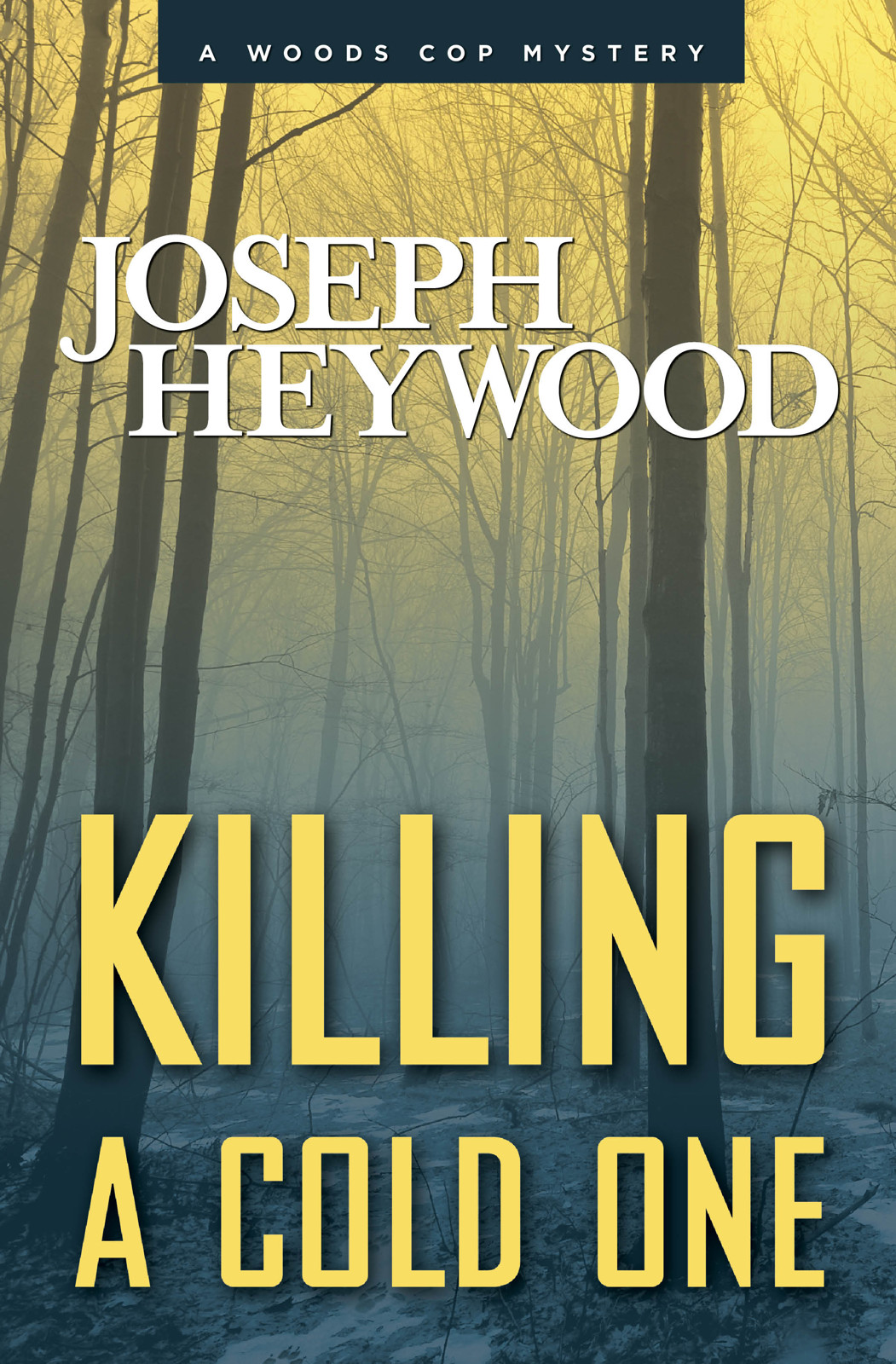Killing a Cold One
Read Killing a Cold One Online
Authors: Joseph Heywood


KILLING A COLD ONE
ALSO BY JOSEPH HEYWOOD
Â
Fiction
Taxi Dancer
The Berkut
The Domino Conspiracy
The Snowfly
Â
Lute Bapcat Mysteries
Red Jacket
Â
Woods Cop Mysteries
Ice Hunter
Blue Wolf in Green Fire
Chasing a Blond Moon
Running Dark
Strike Dog
Death Roe
Shadow of the Wolf Tree
Force of Blood
Â
Stories
Hard Ground: Woods Cop Stories
Â
Non-Fiction
Covered Waters: Tempests of a Nomadic Trouter
Joseph Heywood is the author of
Covered Waters, The Snowfly, Red Jacket,
and
Hard Ground
(all Lyons Press), as well as
The Berkut, Taxi Dancer,
and
The Domino Conspiracy.
The Woods Cop Mystery Series (Lyons Press) has earned him cult status among lovers of the outdoors, law enforcement officials, and mystery devotees. Heywood splits the year between Deer Park and Portage, Michigan. Visit him at
josephheywood.com
.
Â

Â
KILLING A COLD ONE
JOSEPH HEYWOOD

Copyright © 2013 by Joseph Heywood
Â
ALL RIGHTS RESERVED. No part of this book may be reproduced or transmitted in any form by any means, electronic or mechanical, including photocopying and recording, or by any information storage and retrieval system, except as may be expressly permitted in writing from the publisher. Requests for permission should be addressed to Globe Pequot Press, Attn: Rights and Permissions Department, P.O. Box 480, Guilford, CT 06437.
Â
Lyons Press is an imprint of Globe Pequot Press.
Â
Text design: Sheryl Kober
Layout artist: Melissa Evarts
Project editor: Ellen Urban
Â
Map by Jay Emerson, Licensed Michigan Fisherman Emeritus
Â
Library of Congress Cataloging-in-Publication Data is available on file.
Â
E-ISBN 978-0-7627-9765-3
For Shanny (2002â2012),
Best in the Show called life.

PART ONE
JANE RUNNING DOES

1
Sunday, August 3, 2008
DIMONDALE, EATON COUNTY
Chief Eddie Waco stared at the stiff cloth stripes Grady Service had dropped on his home office desk. New to Michigan, Waco was the recently appointed chief of law enforcement for the Michigan Department of Natural Resources. Last summer he had promoted Grady Service from detective to senior master sergeantâa new rank, which had made Service top NCO for the entire state.
Waco's home sat on the west bank of the Grand River, three miles southeast of Dimondale, the chief's property sitting on the borders of both Eaton and Ingham Counties.
“Retiring?” Chief Waco asked.
“Self-demoting,” Service said. “The Mosquito Wilderness is open, and I want it back. I started there and I want to finish there, with my boots in the dirt. I'm sure you can understand.”
The chief dangled the stiff cloth stripes between his fingers. “Sure, I can understand. But you haven't given the new job much of a chanceâand what exactly do I do with these?”
“Bearnard Quinn's your man. Let him recommend his own replacement. It should have been him with the top job first time around. Not me. I'm not cut out for that committee and diplomatic crap.”
“You haven't exactly worn out an office chair.”
“Committee work would kill me. I can't stand not being in the woods.”
“From what I've seen, you h'ain't been a whole lot behind a desk. Listen, Grady, you're the kind of man who stands up and says he's gonna do such and such, and the dang line behind you gets so dern long, nobody can see the end of it. You're a leader.”
“I want my Mosquito back, Chief.”
“It's not
your
Mosquito.” The chief rubbed his eyes, looking weary. Years before, the two men had worked together on a difficult case in Missouri and had become friends. The chief had been recruited to Michigan to take the top job and infuse new thinking into the organization. Service knew Waco was a damn good man.
“Probably do you some good to put your boots in the dirt, too,” Service said.
“Wun't take exception to thet,” the chief said with a tired, flat voice. He looked tired, too.
The chief's home office was over his two-car garage. Service was surprised by piles of books, mostly nonfiction, not yet placed in what looked to be newly built floor-to-ceiling bookcases.
The chief studied him. “You work with that author yet?”
Months ago, the chief had gently ordered him to work with a man who wrote books about the department, but Service wanted no part of writers or journalists or anyone with anything to do with the damn media, unless they could be of use to him. “He was supposed to call me,” Service said.
The chief sat back in his chair. “The man tried repeatedly, but apparently you don't make call-backs.”
Busted.
Service kept his mouth shut.
“Call the man and make it happen,” Waco said.
“Just one day, right?”
“Several days, a week or twoâwhatever he wants. He's an ally, not a foe.”
“I don't like civilians,” Service said.
Waco sighed. “Just call him, Grady.”
An old fart with hearing aids, a stutter, a cane, the writer was alleged to be painfully slow-moving and overly nosy. “Yessir,” he said, with no intention of ever following through.
“The man's a vet,” Chief Waco said. “If that softens the blow.”
“Which war? Between the States?”
“Try to show some grace once in a while. It can work wonders.”
“I'll take your word for it,” Service said.
The chief shook his head and tossed the stripes to him. “Put them in your scrapbook. I'll call Quinn. And don't be taking that writer feller on some death march through one of your dang cedar swamps. He might just have to rescue yore big butt.” Waco held a PhD, but he could talk pure and convincing backwoods when he wanted.
Service looked at the chief. “Thanks, Eddie.”
“Git,” Chief Waco said. “Some of us have paperwork to tend to.”
“You could always do what I'm doing,” Service said.
The chief glared at him. “Don't think I h'ain't considered it.”
Â

2
Wednesday, August 6
SLIPPERY CREEK CAMP
Lousy humid night to sleep, sheets sticking to him. Central Dispatch called him at 0330, night calls rarely presaging anything but bad news.
“Grady, it's Lamb Jones.”
“Not a social call, eh, Lamb?”
There was none of the usual perkiness in Lamb's voice. She was terse, all business; this was unprecedented. Jones was the most proficient dispatcher Service had ever worked with: smart, spunky, determined, optimistic, in her late thirties, and not bad on the eyes. Lamb always insisted she was looking for a better job, which never seemed to materialize. Good thing. Her departure would leave a gaping hole in a critical function of the county's law enforcement chain.
“Two gorks at Twenty Point Pond,” Lamb said. “CO Denninger is on-site with Sergeant Linsenman. She's freaking out and demanding that you join them ASAP.”
Not good.
“Out my door in four minutes, on scene in forty. Tell her I'm rolling,” Service said, pulling on his pants.
He knew he needed a shave, but gorks wouldn't give a shit.
God, listen to yourself: Gorks! Gorks? People deserved dignity even in the ugliness of death, didn't they? What kid of a demeaning cop word is that? It doesn't even conjure an image, only creates a shudder of revulsion on sound alone.
“Troops alerted, Central?”
“Sergeant Linsenman's there; asked me to call Detective Friday. She'll rendezvous with you at US 41 and the old Peshekee Grade Road. Central clear.”
Detective Tuesday Friday was his girlfriend of two years, a Troop homicide dick out of the Negaunee post. They lived (separately) together. Divorced, she had a son, Shigun, and a house in Harvey, outside Marquette. They split time between their homes. Often when he was on extended duty, Service's 160-pound presa canario, Newf, and Cat, the cantankerous stray who had adopted him many years ago, bunked with Tuesday and her son. Service had lost the love of his life, Maridly Nantz, in 2004. His teenage son had died with her, but left a pregnant girlfriend. Service loved his toddler granddaughter, Little Maridly, named for his murdered girlfriend. He supposed he also loved Friday, and she him, but neither had so far used the word
marriage.
He started the truck, reported into service with Lansing and Lamb Jones, his mind in high gear.
If it's red, it's dead:
This was August, venison meat at its tastiest. July 4 was when serious U.P. violators began to work in earnest. Even on still nights with swarms of mosquitoes and deerflies, Service could imagine them out there in his woodsâpoaching the people's animals,
his
animals, his
granddaughter's,
and the knowing cut deep.
He'd never wanted to be a detective in the Wildlife Services Protection Unit, and until a few days ago he'd had another job he'd not wanted, not just as a sergeant, but as the state's top NCO.
Damn joke.
All he'd ever wanted was to take care of the Mosquito Wilderness and eventually to retire. But life dealt shitty hands, and you had to play the cards you caught. Choice played but a small role in real life and seemed to serve largely as an illusion for pathological optimists and overreaching mouth-breathers.
From a selfish point of view, there was some good news in this call: Gorks and homicides were
not
the DNR's responsibility. Linsenman, it seemed, already had decided to push the case over to the State, which meant his girlfriend Tuesday Friday would catch it, in which caseâ
Dammit
âit would affect both their lives. The point now was that Denninger was demanding his presence, which is why Lamb Jones had bumped him. He wondered why Dani had asked for him instead of her sergeant, Willie Celt. Denninger was a relatively new CO, a competent, spunky woman who loved her work. She didn't rattle easily, and knowing this, he kept the accelerator to the floor.
Friday bumped him on the cell phone.
“You know where this place is?”
“Just beyond the butt crack of Bumfuck, Egypt. Technically it's just inside the Marquette border next to the Baraga County line, far northwest corner of the Hurons, south and a hair west of Mount Baldy.”
“Sounds like Backwoods Valhalla.”
“Definition of.”
“Fastest route?”
“North up the Peshekee Grade Road, just past the river mouth west of Van Riper State Park.”
“See you at the turnoff?” she said.
“Who'll be on top?” he asked.
“What a silly, shallow, and insecure man you are,” she teased. “Move, Bucko. And hold that thought.”
